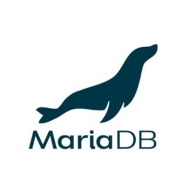

MariaDB and ClickHouse compete in the database solutions category, catering to different aspects of database needs. ClickHouse appears to have the upper hand in processing speed due to its column-based architecture.
Features: MariaDB offers features such as ColumnStore for analytics, multiple replication modes, and global transaction IDs enhancing clustering and cloud deployments. It supports a wide range of analytical workloads. Meanwhile, ClickHouse prioritizes speed with its column-based architecture, providing fast query performance, efficient data compression, and seamless integration with tools like Kafka and Tableau, making it ideal for big data analytics.
Room for Improvement: MariaDB needs to enhance security, scalability, and management features. Improvement is also needed in clustering capabilities, support for time-series data, and compatibility with other databases. ClickHouse could improve its SQL syntax compatibility, transactional data support, and documentation, and enhance third-party tool integration and support for write-intensive workloads.
Ease of Deployment and Customer Service: Both MariaDB and ClickHouse offer support for varied deployment environments including on-premises, private, and hybrid clouds. MariaDB is easy to set up but often relies on community support, with mixed reviews about its technical support. ClickHouse deployment is straightforward, benefiting from community support, but complex environments may require extensive product understanding.
Pricing and ROI: Both MariaDB and ClickHouse are open-source, making them cost-effective choices. MariaDB offers a free community version and a paid enterprise edition for additional support, appealing to businesses seeking lower costs. ClickHouse provides budget-friendly solutions even with third-party vendor support in cloud environments, delivering significant ROI by reducing expensive license needs.
I estimate we save four to five hours per person per week due to this efficiency, translating to around 20 to 25 hours saved monthly for each individual.
We could reduce the amount of employees needed when we migrated to ClickHouse Cloud.
With ClickHouse, we didn't need to spend much on resources, cutting costs by around 25 to 30%.
If more timely support could be provided during critical issues, situations could have been resolved much more quickly, saving considerable time.
When we faced any challenges, the ClickHouse support team provided helpful resolutions.
We utilize AVN ClickHouse, which is effectively managed by AVN, providing bug fixes and developing new functionalities along with architecture reviews.
They came and tuned our queries with one-to-one assistance.
Compared to MongoDB, there are some platform deficiencies, but the support team shouldn't bear that burden.
The vertical scalability is impressive, with high insert throughput, allowing millions of rows per second with low latency.
ClickHouse is highly scalable.
The scalability of ClickHouse is great.
I can confidently say that it is very consistent and stable even when handling high volume loads and real-time streaming analytics across financial and operational domains.
ClickHouse handles large volumes of data efficiently.
ClickHouse is stable, as we did not encounter stability issues in production.
We haven't found issues with the stability of MariaDB.
Another challenge is the lack of robust support for transactional databases, which limits its use as a primary database.
ClickHouse should be able to import data from other types of sources like Parquet and Iceberg tables and all the new upcoming data formats.
My experience with ClickHouse's documentation is that it needs improvement; I think it can be made more beginner-friendly, while the community support is really good.
MariaDB is scalable and easy to scale.
Oracle is very advanced compared to MariaDB, and those advanced features are not available in MariaDB.
My experience with pricing, setup cost, and licensing indicates that it is very expensive—ClickHouse is the most expensive option.
ClickHouse is open source with no hidden fees, offering cost-effective data management.
I found ClickHouse's pricing to be efficient in comparison to other services such as Redshift.
MariaDB is in the pricey range, especially for huge databases handling terabytes of data.
ClickHouse has reduced our storage cost and improved our 99th percentile latency by 40%.
For cost optimization, after deploying the cluster on-premises and using S3 Express, approximately 5x cost savings were achieved on data storage.
ClickHouse positively impacted our organization by absorbing the whole logging system without hassle, storing logs for six months efficiently.
Encryption is available in MariaDB, so we are secure for transmitting data without concern about moving over networks.
Configuration, setup, and schema design are good features in MariaDB.
| Product | Market Share (%) |
|---|---|
| ClickHouse | 6.4% |
| MariaDB | 6.2% |
| Other | 87.4% |

| Company Size | Count |
|---|---|
| Small Business | 13 |
| Midsize Enterprise | 4 |
| Large Enterprise | 8 |
| Company Size | Count |
|---|---|
| Small Business | 27 |
| Midsize Enterprise | 12 |
| Large Enterprise | 26 |
ClickHouse is renowned for its speed, scalability, and real-time query performance. Its compatibility with SQL standards enhances flexibility while enabling integration with popular tools.
ClickHouse leverages a column-based architecture for efficient data compression and real-time analytics. It seamlessly integrates with tools like Kafka and Tableau and is effective in handling large datasets due to its cost-efficient aggregation capabilities. With robust data deduplication and strong community backing, users can access comprehensive documentation and up-to-date functionality. However, improvements in third-party integration, cloud deployment, and handling of SQL syntax differences are noted, impacting ease-of-use and migration from other databases.
What features make ClickHouse outstanding?
What benefits should users consider?
ClickHouse is deployed in sectors like telecommunications for passive monitoring and is beneficial for data analytics, logging Clickstream data, and as an ETL engine. Organizations harness it for machine learning applications when combined with GPT. With the ability to be installed independently, it's an attractive option for avoiding cloud service costs.
MariaDB is an open source relational database created by the original founders of MySQL. It is considered one of the most popular and trusted database servers throughout the world. MariaDB is a valued component found in most cloud offerings and is the default in many Linux tools. It is also widely used by Wikipedia, WordPress, and Google, among other well-known sites. Maria DB easily melds data into concise information from a vast array of applications, such as banking, online shopping, websites, and more.
MariaDB was originally created to improve MySQL performance. It is the most widely chosen database server due to the solution being super fast, robust, user-friendly, and easily scalable. MariaDB also offers a substantial ecosystem of plugins, storage engines, and numerous other valuable tools that make it very attractive for a significant offering of use cases.
The solution’s newest functionalities include compatibility with Oracle Database and Temporal Data Tables, and advanced clustering with Galera Cluster 4, which make it easier for users to research data history from any point in the past. Additionally, the most recent versions include JSON and GIS features. MariaDB is committed to staying an open source solution.
MariaDB Features
Reviews from Real Users
Faustine C., Engineering Supervisor- Corporate Data Solutions and Services at TZ Telecoms Corporation, shares, “The software provides a lot of information on what is happening inside the database. For most performance parameters it is easy to know if something is not right in the configuration or optimization which helps engineers take remedial fine-tuning measures. For example, if the database is underperforming it is easy to know which performance parameter can be adjusted to handle the workload. It is difficult to troubleshoot database issues if many performance parameters can not be monitored or debugged which is the case with some database management systems. It provides great monitoring of data storage, processing, and performance stability which is really important for real-time data storage and processing. It's a user-friendly product.”
A PeerSpot user who is a Senior Engineer at a tech services company relates, “ The solution's high availability is its most valuable aspect. We have found the product to be stable and the initial setup is pretty simple. I'd rate the solution at a ten out of ten. I'm very happy with it overall. I would recommend the solution to others. It's easy to find details about the product online and to learn about it.”
We monitor all Open Source Databases reviews to prevent fraudulent reviews and keep review quality high. We do not post reviews by company employees or direct competitors. We validate each review for authenticity via cross-reference with LinkedIn, and personal follow-up with the reviewer when necessary.